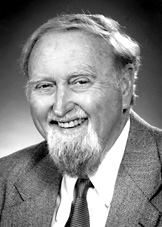Clive W.J. Granger
Sir Clive W.J. Granger, Ph.D., 3 Hon DHCs, 2 Hon DScs, FES, FAAAS, FIIF, FAEA is a Welsh-born economist, and Professor Emeritus at the University of California at San Diego, USA. Along with Robert Engle of New York University he shared the 2003 Nobel Prize in Economics for methods of analyzing economic time series with common trends (“Cointegration”). Watch the 3 minute introduction to his Nobel Prize Lecture. Watch the 33 minute Nobel Prize Lecture! Read his Nobel Prize Lecture. Watch the 22 minute interview with the 2003 Prize Winners in Economics! Read his speech at the Nobel Banquet!
Clive’s great breakthroughs concerned the relationships between different financial or economic variables over time. He showed that traditional statistical methods could be misleading if applied to variables that tend to wander over time without returning to some long-run resting point. He also demonstrated that many variables display similar long-run patterns that can be exploited in statistical analysis. Combining several of these variables can create a joint variable that returns to a resting point, allowing traditional methods to be used. For example, economic forces such as uneven technological progress cause consumption and income to grow over time, but other economic forces, such as constraints on budgets, make them follow similar paths.
This discovery not only led to significant breakthroughs in statistics and macroeconomic forecasting, but also to an important reconciliation between macroeconomic theory and data. He also developed a formal statistical notion of causality based on which variables help to predict other variables. His discovery is widely used and is commonly known as Granger causality. While at UCSD he was famously photographed astride a powerful motorbike with the photo eventually captioned “Rebel without a causal model”.
Clive earned a B.A. in Mathematics from the University of Nottingham in 1955 and a Ph.D. in Statistics from the University of Nottingham in 1959. He was awarded a Honorary D.Sc. Degree from the University of Nottingham in 1992, a Doctor Honoris Causa from Universidad Carlos III de Madrid in 1996, a Doctor Honoris Causa from the Stockholm School of Economics in 1998, a Honorary D.Sc. Degree from the University of Loughborough in 2002, and a Doctor Honoris Causa from Aarhus University in 2003.
He authored Essays in Econometrics: Collected Papers of Clive W. J. Granger, Empirical Modelling in Economics: Specification and Evaluation which is also available as a digital download, Modelling Nonlinear Economic Relationships (Advanced Texts in Econometrics), coauthored Spectral Analysis of Economic Time Series (Princeton Studies in Mathematical Economics), and he inspired Cointegration, Causality, and Forecasting : A Festschrift in Honour of Clive W.J. Granger. Read his full list of publications!
Some of the free publications that Clive has authored or coauthored are Time Series Analysis, Cointegration, and Applications, Non-stationarities in stock returns, Extracting Information from Mega-Panels and High-Frequency Data, Hidden Cointegration, A Dependence Metric for Nonlinear Time Series, and Is Seasonal Adjustment a Linear or Nonlinear Data Filtering Process?. Read a list of his free publications!
His paper Forecasting Stock Market Prices: Lessons for Forecasters was chosen by the editors of International Journal of Forecasting as best paper in years 1992/1993. He received the Biennial Medal from the Modeling and Simulation Society of Australia and New Zealand in 2001 and was inducted into the “Order of Knight Bachelor” by Her Majesty Queen Elizabeth II of England in 2004.
Clive became a Fellow of the Econometric Society in 1972, a Fellow of the American Academy of Arts and Science in 1994, a Fellow of International Institute of Forecasters (Inaugural Group of Four) in 1996, a Distinguished Fellow of the American Economic Association in 2002, and a Corresponding Fellow of the British Academy in 2002.
He was born in Swansea, Wales, and educated at the University of Nottingham, England where he was an undergraduate and postgraduate student, and subsequently became a full professor. In all, he spent 22 years at the University before leaving for UCSD in 1974. In 2005, the building that houses the Economics and Geography Departments at the University of Nottingham was renamed the Sir Clive Granger Building in honor of his Nobel achievement.
Clive is married to Lady Patricia, and has two children, Mark and Claire. He teaches at the University of Melbourne, Australia for a month or more each year and visits the University of Canterbury, New Zealand for two months each year.
